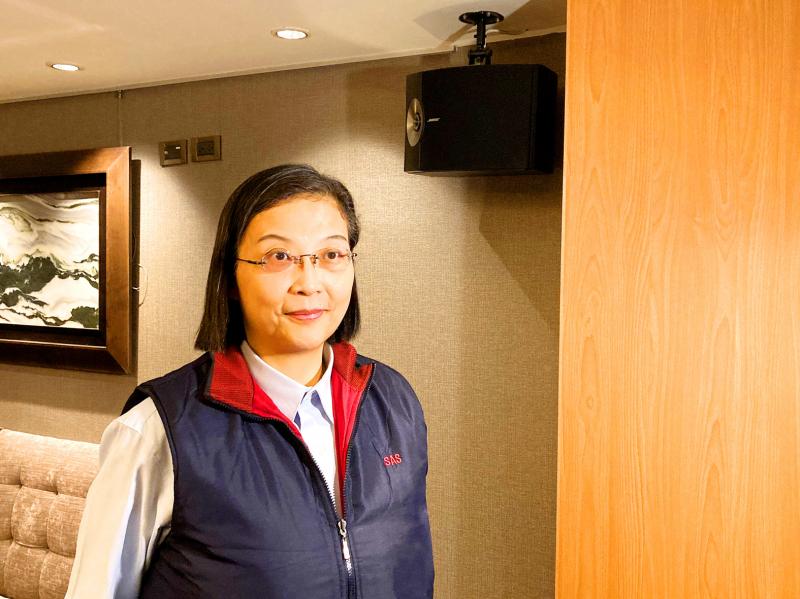GlobalWafers Co (環球晶圓), the world’s No. 3 silicon wafer supplier, on Monday said that it is to raise its prices next year as 5G-related applications and the stay-at-home economy have boosted semiconductor demand during the COVID-19 pandemic, leading to supply constraints.
With limited new supply worldwide, demand is expected to rise to the peak hit in 2018, the Hsinchu-based company said.
GlobalWafers expects to produce an additional 170,000 wafers a month next year as its new 12-inch fab in South Korea is increasing production.

Photo: Lisa Wang, Taipei Times
“We expect the new South Korea fab to reach full capacity next year. We fear we will not be able to supply as many [wafers] as customers have requested,” chairwoman Doris Hsu (徐秀蘭) told reporters at a media gathering in Taipei.
All of the company’s production lines are approaching full capacity and will remain so in the first half of next year, she said.
GlobalWafers is to raise the prices of all its wafers, with 12-inch wafers seeing the highest increases, she added.
The price increases would help hold the average selling price steady next year as some long-term contracts expire, Hsu said, adding that the multi-year contracts usually carry a higher average selling price.
The company is also increasing prices to help absorb volatility on the foreign exchange market, she said, as a strong New Taiwan dollar has eroded profits so far this year.
GlobalWafers expects strong demand to bring its annual revenue next year close to 2018’s record high of NT$59.06 billion (US$2.07 billion).
That forecast does not factor in the acquisition of Siltronic AG. The deal is expected to add NT$45 billion per year to revenue upon completion of the transaction in the second half of next year at the earliest.
“This year is quite a good year for us. As we estimated earlier this year, [revenue] has grown each quarter on a quarterly basis,” Hsu said. “Next year will be better than this year.”
Revenue growth should be expected in each quarter next year, she said.
The pandemic has increased demand for networking equipment, remote education, videoconferencing and online gaming, as well as 5G-enabled smartphones, Hsu said, adding that a global move online has accelerated because of the pandemic.
Accelerating uptake of 5G technology for autonomous vehicles and other devices would make “2022 an even better year,” Hsu said.

South Korea’s equity benchmark yesterday crossed a new milestone just a month after surpassing the once-unthinkable 5,000 mark as surging global memory demand powers the country’s biggest chipmakers. The KOSPI advanced as much as 2.6 percent to a record 6,123, with Samsung Electronics Co and SK Hynix Inc each gaining more than 2 percent. With the benchmark now up 45 percent this year, South Korea’s stock market capitalization has also moved past France’s, following last month’s overtaking of Germany’s. Long overlooked by foreign funds, despite being undervalued, South Korean stocks have now emerged as clear winners in the global market. The so-called “artificial intelligence

NEW IDENTITY: Known for its software, India has expanded into hardware, with its semiconductor industry growing from US$38bn in 2023 to US$45bn to US$50bn India on Saturday inaugurated its first semiconductor assembly and test facility, a milestone in the government’s push to reduce dependence on foreign chipmakers and stake a claim in a sector dominated by China. Indian Prime Minister Narendra Modi opened US firm Micron Technology Inc’s semiconductor assembly, test and packaging unit in his home state of Gujarat, hailing the “dawn of a new era” for India’s technology ambitions. “When young Indians look back in the future, they will see this decade as the turning point in our tech future,” Modi told the event, which was broadcast on his YouTube channel. The plant would convert

‘SEISMIC SHIFT’: The researcher forecast there would be about 1.1 billion mobile shipments this year, down from 1.26 billion the prior year and erasing years of gains The global smartphone market is expected to contract 12.9 percent this year due to the unprecedented memorychip shortage, marking “a crisis like no other,” researcher International Data Corp (IDC) said. The new forecast, a dramatic revision down from earlier estimates, gives the latest accounting of the ongoing memory crunch that is affecting every corner of the electronics industry. The demand for advanced memory to power artificial intelligence (AI) tasks has drained global supply until well into next year and jeopardizes the business model of many smartphone makers. IDC forecast about 1.1 billion mobile shipments this year, down from 1.26 billion the prior

People stand in a Pokemon store in Tokyo on Thursday. One of the world highest-grossing franchises is celebrated its 30th anniversary yesterday.